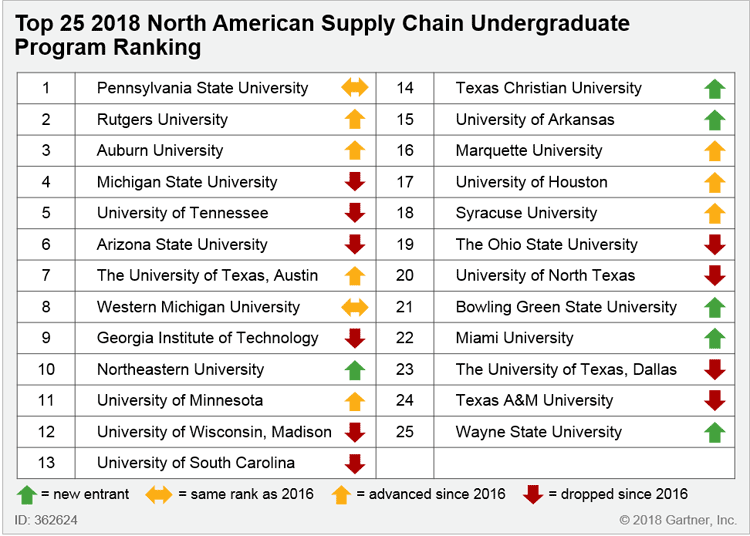Since 2008, the analysts at Gartner have annually ranked the top undergraduate and graduate programs at North American universities.
Last week, we summarized the graduate list, where once again Penn State came out on top. (See Gartner is Back with its Top Supply Chain Graduate University Program Rankings.)
This week, we look at the undergraduate rankings.
Supply Chain Digest Says... |
|
|
The rankings are largely based on a web survey document, sent to 88 supply chain program contacts at universities in the US and Canada. In total, 67 universities responded, 56 of which had graduate supply chain programs and provided complete survey responses.
In 2008, Gartner profiled roughly a dozen programs.
Gartner notes that "In addition to the proliferation of programs, the programs themselves are also growing in size. Even in the past two years, some larger programs have topped out on growth, but many established and relatively new programs continue to expand."
Gartner followed up the surveys with calls to respondents where survey responses were incomplete or unclear, and reviewed university websites and course catalogs for additional information on program and course content.
Responses and clarifications were collected throughout the spring of 2018.
The final placement of university programs in Gartner's relative comparison is based on a composite score of three categories:
Program scope (40%): Number of "attributes" taught, attributes referring to Gartner's supply chain talent attribute model, so really it's about the breadth of course offerings.
Industry value (40%): Includes such factors as citations from a parallel survey of supply chain practitioners, average starting salary for graduates, and average years of work experience of graduate students.
Program size (20%): The number of full- and part-time supply chain students as well as full-time faculty in the program
Where programs tied, Gartner looked at program scope and advanced the program with the higher score. Where programs were still tied on program scope, the program with the higher score for internships, project work and average years of experience was advanced.
The data in this survey is based on the 2016-2017 academic year. The universities include some with a business major with a supply chain concentration, those with distinct supply chain, logistics or operations management degrees.
(See More Below)
|
CATEGORY SPONSOR: SOFTEON |
|
|
| |
|
|
So with that introduction, the list of the top 25 undergraduate programs for 2018 is listed below:

As we believe has always been the case, Penn State sits atop the list, followed by Rutgers University, Auburn University, Michigan State and University of Tennessee to round out the top 5.
If you received such a supply chain degree from Georgia Tech, you are doing pretty well, Gartner reports, with average starting salaries of $75,000. Across all programs, average starting salaries were about $57,000.
Ninety-two percent of graduates are placed within three months of graduation, with 75% placed at or before graduation, about the same as 2016.
There were some surprises. The most highly ranked "new" entrant in the undergraduate ranking is Northeastern University (No. 10), which had barely missed the top 25 in 2016 and had featured prominently in previous rankings. Other returnees to the undergraduate list after absences in 2016 are Texas Christian University (No. 14) and Miami University (Ohio) (No. 22).
Two newcomers making the list for the first time in 2018 are Bowling Green State University (No. 21) and Wayne State University (No. 25).
As we say each year for the Gartner top 25 supply chains, the process is far from perfect here as well, but it's the best we have, and certainly stirs the pot.
What do you think of these Gartner rankings of the top supply chain programs? What would you add the criteria?Let us know your thoughts at the Feedback section (email) or button
below.
Your Comments/Feedback
|